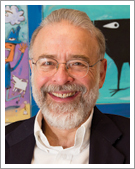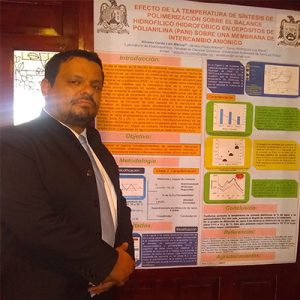 ECS is set to participate in its fifth International Open Access Week, an annual event organized by SPARC, the Scholarly Publishing and Academic Resources Coalition. From October 21-27, ECS will take down the paywall to the entire ECS Digital Library, making over 151,000 scientific articles and abstracts free and accessible to everyone. (more…)
ECS is set to participate in its fifth International Open Access Week, an annual event organized by SPARC, the Scholarly Publishing and Academic Resources Coalition. From October 21-27, ECS will take down the paywall to the entire ECS Digital Library, making over 151,000 scientific articles and abstracts free and accessible to everyone. (more…)
The Electrochemical Society presents prestigious awards at its meetings that recognize outstanding scientific achievement and acknowledge exceptional service to the Society. These sessions are a great opportunity to meet peers and learn more about the leading lights of electrochemistry, as well as early-career scientists and doctoral, post-doctoral, and graduate students—the future of our field.
Among the major society awards presented at the 235th ECS Meeting, Héctor D. Abruña received the Allen J. Bard Award in Electrochemical Science. Abruña is recognized internationally as a leader in electrochemistry and analytical chemistry. Attendees gained insights into his important research and future directions—and so can you by viewing his award address, “Energy Conversion and Storage: Novel Materials and Operando Methods.” (more…)
 Session chairs serve as an integral role in the ECS meetings. We try our best to encourage early-career risers, post-grads, and young authors to get involved in the meetings by acting as session chairs. Although this is a volunteer-based program, it is a great networking opportunity, as it puts you in front of other scientists, engineers, and researchers sharing their work.
Session chairs serve as an integral role in the ECS meetings. We try our best to encourage early-career risers, post-grads, and young authors to get involved in the meetings by acting as session chairs. Although this is a volunteer-based program, it is a great networking opportunity, as it puts you in front of other scientists, engineers, and researchers sharing their work.
Interested in being a session chair at a symposium at the 237th ECS Meeting with the 18th International Meeting on Chemical Sensors (IMCS 2020) in Montréal? Check out the call for papers and reach out to the lead organizer!
The XXXIV National Congress of the Mexican Society of Electrochemistry (SMEQ) and 12th Meeting of the ECS Mexico Section—held this June in Santiago de Querétaro, Mexico—honored Luis Manuel Alvarez Cerda for his work, titled, “Effect of the Polymerization Synthesis Temperature on the Hydrophilic/Hydrophobic Balance in Polyaniline Deposits (PANI) on an Anion Exchange Membrane.”
Each year, SMEQ hosts a poster session which awards prizes by degree (bachelor’s/master’s/doctorate). Alvarez took home the main prize for the best doctorate poster, which includes the opportunity to present at a future ECS biannual meeting.
About Luis
Luis Manuel Alvarez Cerda, chemist since 2005, received his master’s degree in chemistry in 2007. In 2008, the chemistry company Igcar de México/Produquímicos Industriales hired Luis Alvarez to work in the L&D department where he developed more than 30 new products and more than 50 new raw materials until 2017.
Call for Nominations: A National Academies’ Study on the Future of Biophysics
Posted on August 21, 2019 by ECS StaffA message from The National Academies of Sciences, Engineering, and Medicine
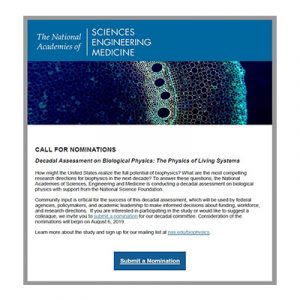
In 1933, ten years after winning the Nobel Prize, Neils Bohr lectured on the importance of applying the principles of physics to the field of biology and living organisms. Over the last several decades, the field of biophysics has generated incredible discoveries, from helping scientists understand the structures of molecules inside of a cell, to predicting and replicating the mechanical movements of large mammals.
About the study
The National Academies of Sciences, Engineering, and Medicine is undertaking a decadal survey of biophysics that will evaluate the current state of the field and identify important future research directions. This study, funded by the National Science Foundation, will serve as a guide for federal agencies and academic leadership as they make decisions regarding biophysics funding, workforce, and research portfolios. (more…)
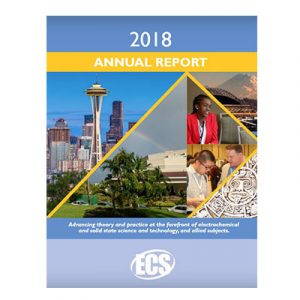 A message from Chris Jannuzzi, ECS Executive Director & CEO
A message from Chris Jannuzzi, ECS Executive Director & CEO
As the executive director of ECS, it is my very great pleasure to present the Society’s annual report. 2018 brought about great transitions for ECS, transitions which will impact the Society for years to come.
Not only did the staff leadership change for the first time in nearly three decades, we have begun the process of redefining ECS’s core business operations to build on our organization’s 117+ year legacy of advancing electrochemical and solid state science and technology for the benefit of humanity. (more…)
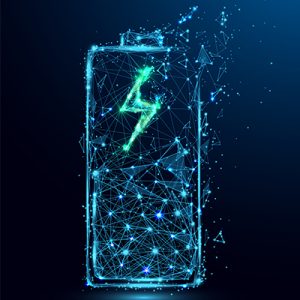 Energy storage is crucial for the successful transition to renewable energy. Yet lithium-ion batteries have major limitations. Demand for lithium has increased exponentially, but production has not kept pace. Extracting lithium by brine mining is a long, costly, energy-intensive, and dangerous process with significant environmental impact. Access is difficult as most lithium mines are in South America.
Energy storage is crucial for the successful transition to renewable energy. Yet lithium-ion batteries have major limitations. Demand for lithium has increased exponentially, but production has not kept pace. Extracting lithium by brine mining is a long, costly, energy-intensive, and dangerous process with significant environmental impact. Access is difficult as most lithium mines are in South America.
Researchers at the Indian Institute of Technology (IIT) Madras developed a rechargeable iron ion battery to replace lithium. It uses mild steel as the anode and can store a high amount of energy. The iron battery withstood 150 cycles of charging and discharging under controlled conditions. After 50 cycles, the battery had 54 percent capacity retention. (more…)
SElectrochem 2019: A Full-Day Event for Young Researchers in South-East UK!
Posted on August 19, 2019 by ECS Staff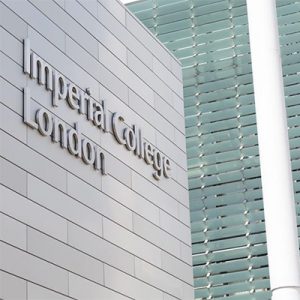 The ECS Imperial College London Student Chapter is co-organizing SElectrochem 2019: chance to meet bright young researchers in the electrochemistry field!
The ECS Imperial College London Student Chapter is co-organizing SElectrochem 2019: chance to meet bright young researchers in the electrochemistry field!
On September 19, 2019, young researchers in the field of electrochemistry (including batteries, fuel cells, catalysis, and corrosion) will gather at Imperial College London for a one-day event to share ideas, present work, and form new collaborations. There will be four sessions of oral presentations, poster sessions during lunchtime, and a prize ceremony with a drinks reception at the end of the day.
Talks with a twist! The student chapter is inviting two-minute “quick-fire” presentations with an accompanying poster, giving early career researchers a great way to introduce their work, inspire others, and encourage interest and collaborations. Prizes are lined up for the best presenters, generously supported by our sponsors that include the Royal Society of Chemistry, The Electrochemical Society, the Faraday Institution, Energy Futures Lab, Metrohm, and Alvatek. (more…)
Save $125!
The 236th ECS Meeting is just around the corner. With five days of technical programing including 2,400 abstracts in 52 symposia, the meeting is sure to have something of interest for everyone. In addition to the technical program, check out some of the other exciting events we have planned.
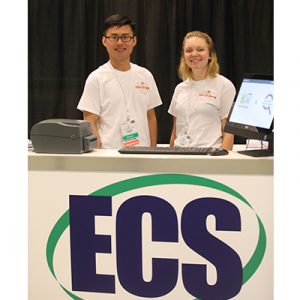 Apply today to serve as a student volunteer at the 236th ECS Meeting in Atlanta, GA. Volunteers receive 50% off their meeting registration, a student mixer ticket, a complimentary student membership for one year, and a volunteer t-shirt too!
Apply today to serve as a student volunteer at the 236th ECS Meeting in Atlanta, GA. Volunteers receive 50% off their meeting registration, a student mixer ticket, a complimentary student membership for one year, and a volunteer t-shirt too!
As a student volunteer, you will work closely with the ECS staff and meet your fellow ECS members and meeting attendees.
Take advantage of this unique opportunity to network and engage with meeting attendees, symposium organizers, and ECS staff! Multilingual speakers are highly encouraged to apply! (more…)


